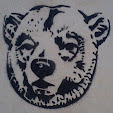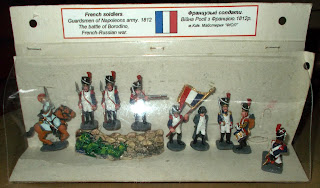Packaging is quite complicated, with a flat
card fixed - by staples - to a curved L
or C-shaped front piece made of
clear propylene or polycarbonate sheet of some kind. The figures are tied-in to
another L-shaped card with fine
copper-wire of the sort you pull from 'phone-cable, and this card slips tightly
into the cover-assembly making an over-all b-shape.
Rack-tree wire-hanger holes are provided in the main 'wrap' and on the end of
the insert, but if you hung them vertically from that hole, some would likely
lose the outer-cover?
Each card carries a white metal element
consisting of one mounted figure, and either five foot figures and an artillery
piece, or seven (or - in one case - eight) foot figures, to which is added a
plaster (chalk-ware) or resin scenic piece which on my five samples is always a
low dry-stone wall with a slight curve and some ivy-like vegetation climbing or
embedded-in one or both ends.
I suspect one of the figures is a character
figure, and you can see from the Airfix guardsman that they are about 35mm. The
figures are unmarked and are fitted to the bases after the figures have been
formed, but possibly 'as' the base is being formed/poured.
The figures are flat-colour painted, the plaster/resin
scenics are washed with a gloss weathering varnish, giving them the appearance
of wet-walls and making it harder to decide on the material without taking a
sharp instrument to them, something I've resisted so far.
Same unit, different contents, with two
walls and the figures, we have enough for a last stand . . . just need some
enemy! The Cyrillic text seems to be the original of the English text to the
left and might have a clue to the maker in the last line - ФІОП = Efiope = FIOP? ФІОЛ = Efioel = FIOL?
Which is where the previous paragraph and
the intro' would have left it, but for Nazar getting back to me earlier this
week and confirming that it is FIOL out of Kiev in Ukraine, although that leaves the last clue
(bottom of post) for further study, were they bought-in as unpainted castings,
or did they just commission a sculptor who signs in the Latin alphabet?
There is something of the Del Prado part-work sets (or was it DeAgostini, I have them somewhere and
we'll look at them some time) about these, but less of an army-builder element,
suggesting a decorative aim rather than gaming?
Other eras are also touched-upon it seems,
these from the wars with the Ottoman Empire (next one; any day now!) I assume,
but the cannon is just a re-paint of the previous piece.
That's the piece they need to give 'Johnny
Turk' a headache, my tourist keepsake of the Tzar Gun! In both cases, 17th and
19th Century's there are no gunners supplied which is a bit odd, especially for
any war games, or gaming system, so they may be directly aimed at the tourist
market like the old plastic Tzar Gun?
I think I bought them in the 2000's from a
dealer at one of Andy Harfield's shows down in Kent, and they looked slightly
aged then, so possibly 1980's, certainly 1990's, and/but they may have been a
Herne purchase?
Ah, Johnny Frenchie . . . or should that be
Pierre? Some fine Wellingtonian enemy for the earlier Russians, and his
(Wellington's) nemesis is there too, look, the little corporal of Emperor'ness!
The round-based figures have the same
two-part appearance with two foot-pegs (?) semi-melted into the base, while the
horses have a thin, integrally-moulded base. We will look at the oblong bases
in a minute - saving the best only real clue 'till the end!
I don't know why one has eight foot-figures
against the usual seven, and the cavalryman is the same but the mount differs.
Both have the Corsican in command, another clue to tourists over gamers as an
intended end-user group.
These are all bearskin'ed imperial or old
guard while the other set had some line infantry or young guard in shakos. And
. . . luckily, one's come loose!
And this is he, nothing to write home about
on the painting front (but you can get a Blog post out of it!) but it's solid
enough for a commercial paint-job at this scale and probably stands up well-enough
against the - slightly smaller? - part-work figures previously mentioned? Note
also that the base is a more standard integral part of the moulding and has a
small cypher mark in the corner on the underside.
Seems to be a Roman alphabet J&D rather than anything Cyrillic,
but I turned it the other way up just in case? Does anyone recognise these
figures, sets or the mark, or know from whence they came?
And thanks agin to Nazar for his help in getting these straight.
And thanks agin to Nazar for his help in getting these straight.















No comments:
Post a Comment